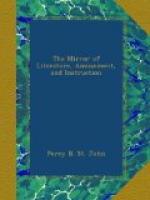Jupiter is in conjunction with the sun on the 18th at 10-3/4 h. evening. He is afterwards a morning star, preceding the sun in his rising.
The Georgian planet, or Herschel, ceases from his retrograde movement on the 4th, and appears stationary till the 11th, when he resumes a direct motion. He is still in a favourable situation for evening observation. Its great distance from the earth, and the long period of its revolution round the sun prevent any rapid change in its situation among the fixed stars; the place therefore which the Greorgium Sidus occupied in Capricornus in July, (see MIRROR for that month) is so contiguous to that planet’s present position, that the observations then made may be a sufficient guide for the present month. Its slow motion among the fixed stars makes it participate in that daily change which is common to them, hence the planet may be observed in the same place a few minutes earlier every night. It comes to the south on the 1st at 7 h. 16 min., and on the 31st at 5 h. 26 min. evening.
The moon is in opposition on the 5th; in apogee on the 11th; in conjunction on the 20th; and in perigee on the 23rd. She is in conjunction with Saturn on the 13th at 3-1/4 h. after with Mars on the 18th at 2 h. morning; and Jupiter and Venus on the 20th, with the former at 1-1/2 h. and the latter at 11 h. afternoon, also with Mercury on the 21st at 10-1/2 h. afternoon.
The Solar luminary is eclipsed on the 20th at 3 h. 47 min. afternoon. He is above the horizon during the whole time the central shade is passing over the disc of the earth, but the moon having nearly 2 deg. southern latitude at the time of true conjunction, in middle of the eclipse, it will be invisible not only to us but to the whole boreal hemisphere of the globe. He enters Scorpio on the 24th at 4 h. 36 min. morning.
From the observations made upon the annual eclipses, it appears that the period of the moon is now shorter, and consequently that her distance from the earth is now less than in former ages, and this has been considered as an argument against those who assert that the world may have existed from eternity; for it was hence inferred that the moon moves in a resisting medium, and therefore that her motion must by degrees be all destroyed, in which case she must at last come to the earth. But M. de la Place has shewn that this acceleration of the moon’s period is a necessary consequence of universal gravitation, and that it arises from the action of the planets upon the moon. He has also shewn that this acceleration will go on till it arrives at a certain limit, when it will be changed into a retardation, or in other words, there are two limits between which the lunar period fluctuates, but neither of which it can pass.
PASCHE.
* * * * *
Fine Arts.
* * * * *
HANS HOLBEIN.




